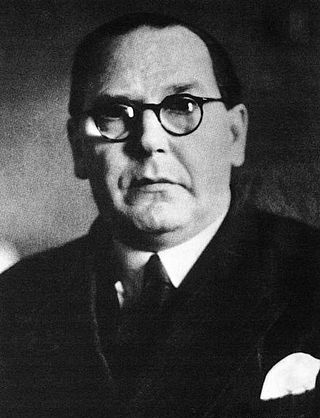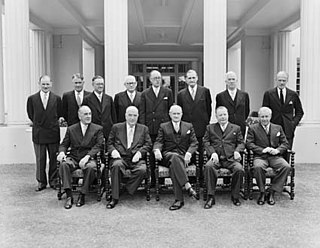The Labour Party is a social-democratic political party in the Netherlands.

The Israeli system of government is based on parliamentary democracy. The Prime Minister of Israel is the head of government and leader of a multi-party system. Executive power is exercised by the government. Legislative power is vested in the Knesset. The Judiciary is independent of the executive and the legislature. The political system of the State of Israel and its main principles are set out in 11 Basic Laws. Israel does not have a written constitution.

Willem Drees Sr. was a Dutch politician of the defunct Social Democratic Workers' Party (SDAP) and later co-founder of the Labour Party (PvdA) and historian who served as Prime Minister of the Netherlands from 7 August 1948 to 22 December 1958.

Martti Juhani Miettunen, was a Finnish politician who served twice as Finland's prime minister, from 1961 to 1962 and again from 1975 to 1977.

The French Fourth Republic was the republican government of France from 27 October 1946 to 4 October 1958, governed by the fourth republican constitution of 13 October 1946. It was in many ways a revival of the Third Republic, which governed from 1870 during the Franco-Prussian War to 1940 during World War II, and it suffered many of the same problems.

The prime minister of Malta is the head of government, which is the highest official of Malta. The prime minister chairs Cabinet meetings, and selects its ministers to serve in their respective portfolios. The prime minister holds office by virtue of their ability to command the confidence of the Parliament, as such they sit as members of Parliament.
The Catholic People's Party was a Catholic Christian democratic political party in the Netherlands. The party was founded in 1945 as a continuation of the Roman Catholic State Party, which was a continuation of the General League of Roman Catholic Caucuses. During its entire existence, the party was in government. In 1977, a federation of parties including the Catholic People's Party, the Anti-Revolutionary Party (ARP) and the Christian Historical Union (CHU) ran together under the Christian Democratic Appeal (CDA) banner. The three participating parties formally dissolved to form the CDA in 1980.

Karl-August Fagerholm was a Finnish politician. Fagerholm served as Speaker of Parliament and three times Prime Minister of Finland. Fagerholm became one of the leading politicians of the Social Democrats after the armistice in the Continuation War. As a Scandinavia-oriented Swedish-speaking Finn, he was believed to be more to the taste of the Soviet Union's leadership than his predecessor, Väinö Tanner. Fagerholm's postwar career was, however, marked by fierce opposition from both the Soviet Union and the Communist Party of Finland. He narrowly lost the presidential election to Urho Kekkonen in 1956.
The representative of the Government in the Senate is the member of the Senate of Canada who is responsible for introducing, promoting, and defending the government's bills in the Senate after they are passed by the House of Commons. The representative is appointed by the prime minister.

The Seventh Menzies ministry was the 37th ministry of the Government of Australia. It was led by the country's 12th Prime Minister, Robert Menzies. The Seventh Menzies ministry succeeded the Sixth Menzies ministry, which dissolved on 11 January 1956 following the federal election that took place in the previous December. It is the first ministry to consist of a two-tier ministry, with only senior ministers being members of Cabinet, while the other ministers are in the outer ministry. With the exception of the Whitlam government and the caretaker First Fraser ministry, this practice has endured to this day. The ministry was replaced by the Eighth Menzies ministry on 10 December 1958 following the 1958 federal election.

Louis Joseph Maria Beel was a Dutch politician of the defunct Roman Catholic State Party (RKSP) and later co-founder of the Catholic People's Party (KVP) now the Christian Democratic Appeal (CDA) party and jurist who served as Prime Minister of the Netherlands from 3 July 1946 until 7 August 1948 and from 22 December 1958 until 19 May 1959.
The Cabinet of South Africa is the most senior level of the executive branch of the Government of South Africa. It is made up of the president, the deputy president, and the ministers.

The Government of Singapore is defined by the Constitution of the Republic of Singapore to comprise of the President and the Executive. Executive authority of Singapore is vested in the President but exercised on the advice of the Cabinet led by the Prime Minister. The President, acting as the Head of State, may only act in their discretion in appointing the Prime Minister, acting as the Head of Government; as well as withholding consent for the dissolution of Parliament; along with performing key checks on the Government in addition to the ceremonial duties of the Head of State inherited from the Westminster system. The Cabinet, consisting of the Prime Minister and ministers appointed by the President on the Prime Minister's advice, is responsible for heading the Executive through ministries and other statutory boards. At the end of the term or at any time during the term, once the President has consented to a request made by the Prime Minister to dissolve Parliament, Parliamentary General Elections are held to elect members of Parliament for a new term. The President, in their discretion, then appoints a Prime Minister who is a member of Parliament representing any political party or coalition of political parties who in their judgement is likely to command the confidence of the majority of the members of Parliament. The Prime Minister then forms the Government and, along with the Cabinet, sets the general direction and control of the Government for the next term.

The government of France, officially the Government of the French Republic, exercises executive power in France. It is composed of the prime minister, who is the head of government, as well as both senior and junior ministers. The Council of Ministers, the main executive organ of the government, was established in the Constitution in 1958. Its members meet weekly at the Élysée Palace in Paris. The meetings are presided over by the President of France, the head of state, although the officeholder is not a member of the government.

The Pride of Performance, officially known as Presidential Pride of Performance, is an award bestowed by the Islamic Republic of Pakistan to recognize people with "notable achievements in the field of art, science, literature, sports, and nursing". The Pride of Performance is the highest national literary award of Pakistan conferred upon its citizens and, while it recognizes literary contribution, it can also be conferred upon foreign nationals. It is usually awarded by the president once a year at the Pakistan resolution day, but announcements are made at independence day ceremony held on 14 August. The award recommendations are made by the country's administrative units or respective ministry to the state governments where officials send it to the Cabinet Secretariat and then president or federal government for final approval.

The Third Drees cabinet, also called the Fourth Drees cabinet, was the executive branch of the Dutch Government from 13 October 1956 until 22 December 1958. The cabinet was a continuation of the previous Second Drees cabinet and was formed by the social-democratic Labour Party (PvdA) and the christian-democratic Catholic People's Party (KVP), Anti-Revolutionary Party (ARP) and the Christian Historical Union (CHU) after the election of 1956. The cabinet was a Centre-left grand coalition and had a substantial majority in the House of Representatives, with Labour Leader Willem Drees serving as Prime Minister. Prominent KVP politician Teun Struycken served as Deputy Prime Minister and Minister of the Interior, Property and Public Organisations.

The Second Beel cabinet was the executive branch of the Dutch Government from 22 December 1958 until 19 May 1959. The cabinet was formed by the Christian-democratic Catholic People's Party (KVP), Anti-Revolutionary Party (ARP), and the Christian Historical Union (CHU) after the fall of the previous Third Drees cabinet. The caretaker cabinet was a centre-right coalition and had a slim majority in the House of Representatives with former Catholic Prime Minister Louis Beel returning as Prime Minister and dual served as Minister of Social Affairs and Health. Prominent Catholic politician Teun Struycken continued as Deputy Prime Minister and Minister of the Interior, Property and Public Organisations from previous cabinet and dual served as Minister of Justice.

Konstantinos Georgakopoulos was a Greek lawyer, politician and Prime Minister of Greece.

Antoon Arnold Marie "Teun" Struycken was a Dutch jurist and politician, co-founder of the Catholic People's Party (KVP) – now merged into the Christian Democratic Appeal (CDA).
The Ministry of Planning and Finance administers Burma's monetary, fiscal policies and national planning.















